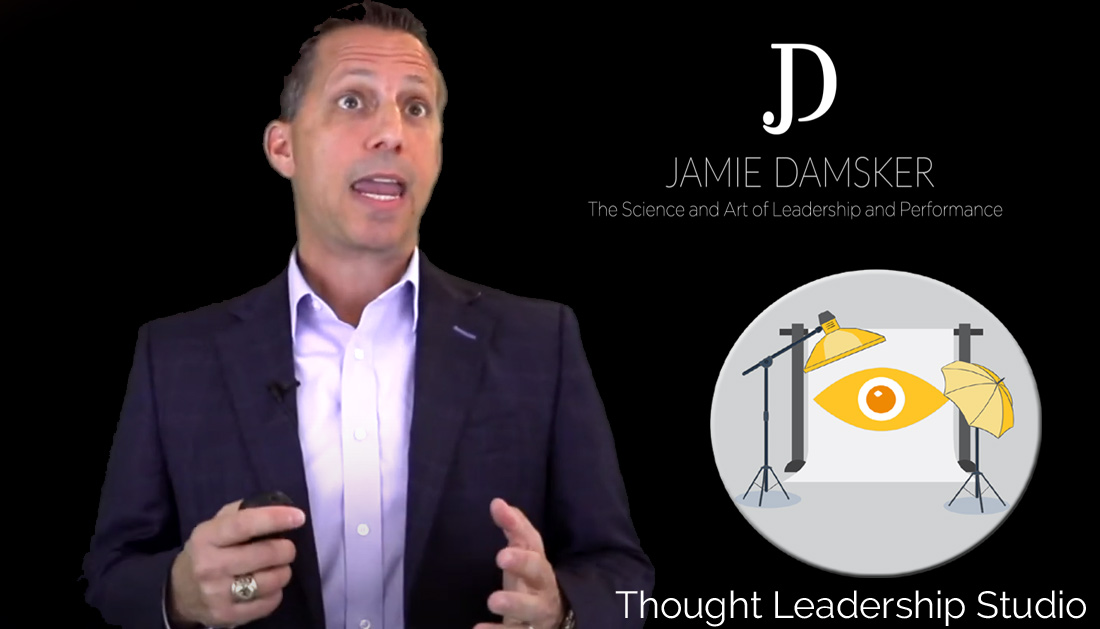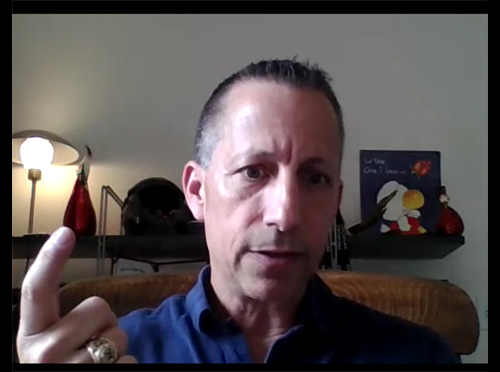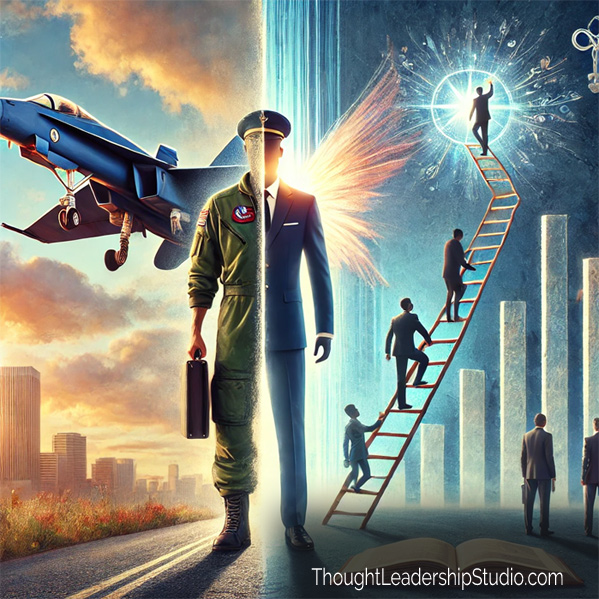Thought Leadership Studio Podcast Episodes:
Intentional Leadership with Jamie Damsker
Episode 77 - Awakening to Authentic Leadership: Jamie Damsker's Journey from Fighter Aviator to Transformative Coach

#coaching, #communication, #consulting, #executivepresence, #influence, #inspiration, #interview, #interviews, #leadership, #lifebalance, #management, #motivation, #paradigmchange, #paradigmshifts, #speaking, #strategicthoughtleadership, #thoughtleadership
Or Click here to listen or subscribe on appWhat this episode will do for you
:- Discover Jamie's Coaching Journey: Learn about Jamie Damsker’s transition from a US Air Force officer and technology consultant to a renowned leadership coach.
- Importance of Being Present: Understand the impact of being intentional and present in enhancing relationships and performance.
- Distinction Between Being and Knowing: Explore the difference between being and knowing, and how this awareness can transform your approach to leadership.
- Questioning Your Own Truth: Gain insights into the power of questioning one's own beliefs and being open to others' perspectives for personal growth.
- Altering Your Relationship with Thoughts: Learn how altering your relationship with your thoughts can lead to greater alignment with your goals and improve overall well-being.
Jamie Damsker.
In this episode, I'm thrilled to introduce Jamie Damsker.
Jamie Damsker is a renowned public speaker and leadership coach known for his transformative approach to personal and professional development. With a background as a US Air Force officer and fighter aviator, and significant experience in technology deployment and strategic consulting, Jamie has built multimillion-dollar businesses and facilitated international acquisitions.
Jamie shares his journey to coaching, emphasizing the importance of being awake to one's thoughts and way of being. He explores the distinction between being and knowing, and how intentional presence can enhance relationships and performance. Jamie discusses the power of questioning one's truth and altering the relationship with thoughts to align with personal and professional goals.
Some of Jamie's coordinates:
Curated Transcript of Interview with Jamie Damsker
The following partial transcript is lightly edited for clarity - the full interview is on audio. Click here to listen.
Chris McNeil: I'm your host of Thought Leadership Studio, Chris McNeil, and I'm sitting here across Zoom with Jamie Damsker, a renowned public speaker and leadership coach. Jamie is recognized for his ability to help individuals access their extraordinary selves and achieve profound performance in their lives.
He began his career as a US Air Force officer and fighter aviator earning the distinguished flying cross for his service. Transitioning to the private sector, Jamie made significant impacts in technology deployment and strategic consulting, building multimillion dollar businesses and facilitating international acquisitions.
Now he brings his experiences and unique perspectives to his true passions, public speaking and coaching, whether delivering a keynote talk to corporate leaders of working one-on-one with a client, Jamie has a gift for guiding people to discover and nurture the powerful leader within them. Welcome, Jamie.
 Jamie Damsker: Thank you, Chris. Good morning. Thank you for that kind introduction.
Jamie Damsker: Thank you, Chris. Good morning. Thank you for that kind introduction.
Chris McNeil: My pleasure. I find your background fascinating, and we were talking a little bit before we started recording about the intrinsic rewards of coaching and the peak performance self through fitness mastery and things like that.
And one question I'd like to lead with - to help listeners have some context for where a guest is coming from - is your current path of coaching and public speaking of positively influencing people to find their best selves, was there a pivotal moment or an event or something or a shift in thinking that led you in this particular direction?
From Aviation to Leadership: Jamie Damsker’s Coaching Evolution
Jamie Damsker: Yeah, there was absolutely an event. It was in about, it's just about 10 years ago, and I don't know if the details of the event matter, but what I would say is at the time when I woke up that morning in October of 2014, I think whatever day it was, I was running a consulting practice practice that did consulting for government agencies.
And yeah, I had staff across the country. I had two young sons at home, both in a really good private school, my beautiful wife who I stole away from Norway, successful dentist in the pediatric practice. So by all measures from the outside looking in my life was really good, and it was really good. It still is, by the way. It's better than good now. And I went to an event at my alma mater, the Citadel, and the idea was to show up as a local business leader who just happened to be a graduate as well, but that's not necessary, and spend an entire day with the who are going to go in the civilian direction, not all go in the military.
 And I sat at a table in the round with a bunch of seniors, and by mistake, they put another business person at the same table with me. It's supposed to be just one business leader and a bunch of cadets from the Citadel. And for those of your listeners who aren't familiar, the Citadel is a military college here in Charleston. And that other person introduced himself as a coach.
And I sat at a table in the round with a bunch of seniors, and by mistake, they put another business person at the same table with me. It's supposed to be just one business leader and a bunch of cadets from the Citadel. And for those of your listeners who aren't familiar, the Citadel is a military college here in Charleston. And that other person introduced himself as a coach.
Now in that moment, to be honest, and I am trying to recollect this accurately, Chris, I didn't know what a coach was beyond those in the domain of sports. I knew what a mentor was. I knew what a boss is, a leader. Well, my definition of leader back then, and I didn't know what a coach was, and he spent the rest of the day, the two of us with these cadets and the things that came out of his mouth, they really threw me off.
They weren't what I commonly heard people say. He talked a little bit about his job. He said what he charged people. I thought that was insane. Who would pay that kind of money for that kind of thing? And by the end of the day, there was just something inside of me that was just off or I'll say Ill at ease. And that night, this person happened to send out a blast email to all of the other leaders with an eBook attached, and he thanked everyone for showing up. And I read the eBook, and after I read the eBook, I was even more at, I'll say off balance.
It shook me to my core, woke me up, what am I missing? And so I reached out to him. We had some conversations, and I'd say this was in October of that year, I told you that when he talked about how much he charged what he did, I thought it was insane.
I didn't understand it. Two months later, I hired him and I hired him with the express intention of becoming a world-class coach like he is. It just made sense to me. Now, that's not why most people hire coaches. I could have hired him for me to create myself as a better husband, a better father, a better leader in the business I was in.
But there was a pulling of me towards that work. And so yeah, it's a very specific moment. I didn't walk around dreaming about being a coach. There are some people who just sort of learn about it. It's more prevalent on social media now, but back then no one talked about coaching and I really haven't looked back.
Chris McNeil: That's awesome. So you started out by hiring a coach?
Jamie Damsker: Yes.
The Depths of Coaching: Jamie Damsker on Transformative Relationships
Chris McNeil: Yeah. It opens up a whole new world and people, I guess have a mental model of a coach of a high school football coach, kind of. All right, let's get you ready for the game. But how deep can it go? How far and how wide and how broad and how high is the realm of coaching to you in how you utilize it?
Jamie Damsker: Yeah, my one word answer, and I'll expound on it, is yes, and the word coaching. The word consulting is a bit overused. And I grant people the space, so it means different things to different people, but I don't have a better word. So I call myself a coach.
I'll give you an example. Someone may hire me because they want to grow their business. Sounds pretty reasonable. Like I want to get a coach to make me a better leader so I can lead my people and we can perform better and we may come together in those terms. And what we might discover together is a way for them to show up as a husband or a wife or parent in the most profound way that completely alters their relationship with their spouse or their children and will still handle the business thing.
 Now, I've been with people around some of the rawest things going on in their lives, everything from infidelity to dire sickness to children who are questioning their gender to COVID, to financial ruin.
Now, I've been with people around some of the rawest things going on in their lives, everything from infidelity to dire sickness to children who are questioning their gender to COVID, to financial ruin.
And I can't get there to that depth of a conversation with someone to have them be willing and desire to expose themselves to me. If at the front end we don't create a relationship that what I would call is rare. I grant people the intimacy they have in their relationship with their spouse as an example. And the relationships that I'm committed to creating the relationships that I've experienced with my own coaches is beyond intimate.
And I don't know how to get to the results that someone really wants deep down inside if they're not willing to go there. And I hold myself accountable for getting us there. I meet people where they're at. They've got to bring themselves to the relationship. I'm really clear about it. And if I'm awake and I'm being effective, I will create where they are, the space for them to see that they can step into, so to speak, to bring that level of intimacy
Chris McNeil: That's profound. And is creating this environment of deep rapport, maybe for lack of a better word, essential to helping people discover deeper potential within themselves. Am I understanding that rapport equals self-discovery guided?
Jamie Damsker: Yeah. I call this a journey of subtraction. I think it's Michelangelo, when they asked him about creating David, and I'll butcher the quote, and I don't even know if it can be accurately attributed to him, but I'm going to say it anyway because I find it to be so profoundly appropriate to this conversation. David was always in there. He just had to chip away the stone to get to him.
To me, this is the same. I have an advantage. I know beyond a doubt what you have behind all of the thoughts and the feelings and the emotions that are in your way. And so my role, some of it is probably most of it, or the heavy lift would be to be with another human being, to have them break through that muck and mire that we've been piling on since we were kids. Our parents didn't help.
Sorry to say it. Parents, I'm a parent too. And when we can get behind all it or above it, however you want to, whatever perspective you want to use from that place, we can create anything. To answer your question specifically, I don't know how I can have another human being step into that possibility if we have a relationship at a superficial level.
And I also recognize Chris, that it's up to me. I hold myself responsible for teaching people how to show up to me because it's not common. There's nothing that we've talked about thus far either before we started taping or now or I have a sense for the rest of our time together that's common. And most people have lived common. It's just, it's the natural pull of society and our conditioning that we do common.
Changing Thoughts, Changing Worlds: Jamie Damsker’s Approach to Self-Discovery
Now, there's a big broad spectrum of common, but I'm looking to be with people in a very uncommon way so they can uncommonly create the life that they actually want, not the one that's dictated to them or that society tells them they should have.
Chris McNeil: That's awesome. And it seems to be a theme in your work - from listening to some prior interviews you did, and looking at your work - it seems to the deconditioning aspect to find what might be termed the authentic self behind the conditioning. And you mentioned things like helping people take control of their thinking process and realize that we got this dialogue, inner dialogue where we generate our "world".
 And that's why I say when we talk about Strategic Thought Leadership around here, a lot as strategic thought leadership can change the world - for the person you're working with ... or for even the consumer of your content.
And that's why I say when we talk about Strategic Thought Leadership around here, a lot as strategic thought leadership can change the world - for the person you're working with ... or for even the consumer of your content.
Because if you change their thinking in a positive way, you've changed the world for them. So you're really changing the world for people.
Jamie Damsker: Well, I'm loath to give myself the credit more accurately for me. They're changing the world for themselves. I can be a Sherpa, so to speak, but I can't climb the mountain for you.
Chris McNeil: Totally understood.
Jamie Damsker: And as it relates to thinking, my relationship with thinking and thought, may I share this? Yeah, is we're not our thoughts yet. We walk through the world like we are. And I'll give you an example. Think about language. I am angry, I am frustrated, I am happy, I am scared. And I can promise you a profound shift can happen in your life if you can alter that relationship. And it can sound nuanced, but to me, it's as dramatically different as night and day. I have the thought of being angry.
If I can see, we have between 30 and 60,000 thoughts per day and no one, this is the uncommon thing I promised you, and no one has ever told us or asked us or challenged us to question our thoughts. So imagine you're looking to create a difference in the world, and you are hamstrung by those thoughts. And the vast majority, I'd say over 95% of those thoughts we have, Chris, are inconsistent with the thoughts we'd want to have to create the outcomes we say we want to create. And then we look at the outcome versus the desired outcome, and there's a gap between them. And then what we do is we look outside of ourselves to put fault in that gap. Well, it's because of this. It's because of that thought, thought, thought. So I take a stand for, stand for, we're all creators.
We are amazing creators, and you have a choice what you create. Nothing on this planet that's manmade has ever been created without a preceding use of language, written language, spoken language, and of course, thought language, language creates, but only always. And if we have a relationship with our thoughts, like most of us do, that they're just us and we just swing wildly like a sine wave or a cosine wave with our thoughts. I'm happy, I'm sad, I'm scared. I'm not. I'm this, I'm that. He's that. She's, I'm judging, I'm judging, I'm judging.
The Intersection of Thought and Success
We're creating, creating, creating. And then we wonder, why is it that what I'm creating isn't what works for me? Why do I have this underlying anxiety or frustration with my life? And human nature is we look outside of ourselves for a cause and that simply perpetuates it. Part of my work or what I see to be where breakthroughs really occur is when a human being can one, realize they're not their thoughts or they're powerful, they'll work overtime to convince you.
No, they're true. I mean, if you think about, and mostly in my public speaking, I speak a lot through the lens of neuroscience, a little bit about how the brain works, but from an operational perspective, how we use it, those thoughts that aren't useful come on so much more quickly than the thoughts that are useful, that it's overwhelming. And the only way to out create those is to alter your relationship with them.
So if I can be with a human being, Chris, to have them alter their relationship with their thoughts, they'll discover that what they start to create is more and more consistent with what they tell themselves they want to create. And it shows up in every domain of your life. Work, family, health, as you and I talked about, there are days, Chris, when I wake up in the morning, believe it or not, I don't want to go to the gym.
 I didn't want to go this morning, but I'm a busy day today. If the thought I'm too tired, if I took it on like it's true, it's me. I'm tired. I promise you right now, I would've told you I didn't go to the gym this morning. Or more likely I wouldn't even bring up the subject. I don't want to tell anyone I to go to the gym. No, I see the thought as not useful.
I didn't want to go this morning, but I'm a busy day today. If the thought I'm too tired, if I took it on like it's true, it's me. I'm tired. I promise you right now, I would've told you I didn't go to the gym this morning. Or more likely I wouldn't even bring up the subject. I don't want to tell anyone I to go to the gym. No, I see the thought as not useful.
I remind myself what I'm committed to in this case, when I'm at the domain of health and I move my body and I go to the gym and I do what's required. And that happens over and over. It happens in domains of business. It happens in domains of think about, are you married Chris? I am. Yeah. Think about the domain of your marriage. This is one of my favorite topics because one, it's so tender, and two, we're so asleep.
We take it for granted. And I'll give you exhibit A, if I may. During Covid, when everyone was stuck at home, the divorce rate skyrocketed. I was not surprised. We had no place to hide from our relationships anymore. We're so asleep, we're so messy. The distinction I create or I share with people is think about if you're a leader at work and you have a challenge and you'll stay up at night thinking about it, you'll go into work early, you'll call in your best and brightest, you'll grab the whiteboard and the seven different colored pans, and we're not leaving until we solve it.
We really bring ourselves to it at home. Have a crossword with your spouse. What do we do? We walk out, we go to our neutral corner, we sulk. Think about that at work. We'll lose sleep over it. But for the person we've committed to being a partner for the rest of our lives, they'll just, yeah, we're asleep. We're absolutely asleep. And that's an example of where, well, I just believe the thoughts. And if I could wake someone up, which I'm committed to, I've seen them grow their business and it's not a surprise to me, or it's not just a happy coincidence that what they created home is just a more profound ...
Chris McNeil: Well, our lives are a reflection of our thoughts, are they not? And people in business who might be listening to this thinking, how can I improve my business or improve my online influence to improve my business? It's going to be your performance is a reflection of your mind.
And I'm getting a couple really deep threads here. One of them is the dis-identification with your thinking process. Because gee, we all are conditioned by society and we pick up all these, you are this, you are that. This works this way, this works that way. All these belief systems about ourselves and about life, and it's just random collecting beliefs from a neurotic society. And society is not sane. We can become sane within it outside of it, but affects us structurally if we identify with these thoughts and identify with them to the level that this is who I am and this is how it is the world.
But you're bringing up a process of separating from that and seeing that we'll be the first steps for someone listening to this thinking, how do I start to become more aware of what my thoughts are and then take control of them and get them in alignment with what's really most important to me?
***************************************
The transcript is lightly edited for clarity and is a partial transcript- the full interview is on audio. Click here to listen.
***************************************
Free Stuff and Offers Mentioned in Podcast
***************************************
***************************************